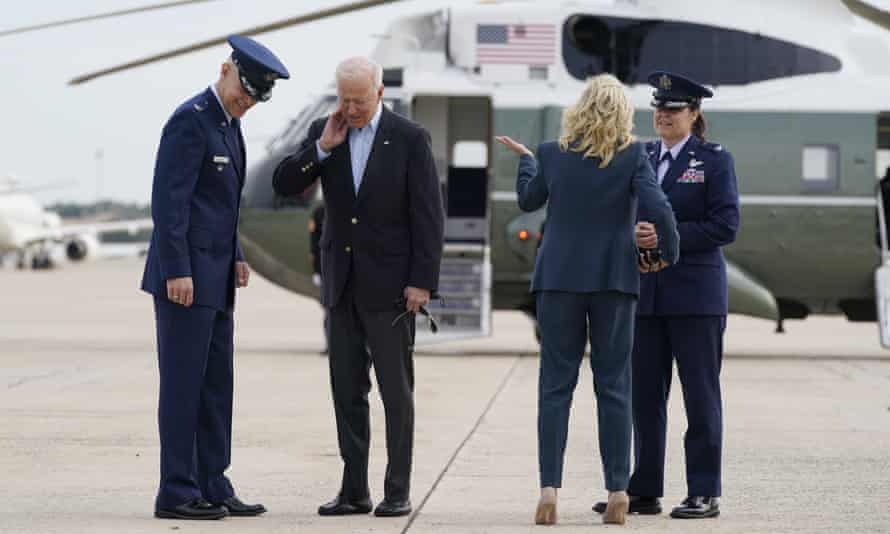Joe Biden and the Russian president, Vladimir Putin, are set to hold their 16 June summit in an 18th-century Swiss villa overlooking Lake Geneva, a soothing setting for what promise to be heated talks.
The US president’s first foreign trip since entering the White House got off to an inauspicious start, however, when he was assaulted by a cicada before boarding Air Force One bound for the UK on Wednesday morning, ready to begin his overseas visit by attending the G7 meeting in Cornwall.
Biden made light of it, as he prepared to take off for Europe while leaving his domestic legislative agenda up against a brick wall after the collapse on Tuesday of the latest bipartisan talks on infrastructure spending. Republicans also refuse to come onboard with sweeping voting rights reform, prompting the moderate Democratic senator Joe Manchin to hold back support, too.
Biden will meet Boris Johnson to discuss the UK-US relationship and he and Jill Biden will meet Queen Elizabeth at Windsor Castle on Sunday.
On Wednesday morning, cicadas could be seen whizzing through the air at Joint Base Andrews in Maryland, where Biden and the first lady were crossing the tarmac to the Air Force One jumbo after transferring by helicopter from the White House.
A huge brood of cicadas emerged a few weeks ago on the US east coast and into some midwest states after 17 years underground, and the insects are creating news of all kinds and now at the top level of US power.
The press corps was delayed for five hours before flying out on Tuesday evening to try to be in place to cover Biden’s trip to the UK for the G7 meeting, a visit to Brussels for a Nato summit and a meeting with Putin in Switzerland at which he is expected to raise security matters and cyber-attacks on US entities by criminal gangs based in Russia and the region.
On Wednesday morning, Biden was chatting with members of the armed forces who were escorting him between aircraft, when he slapped sharply at his neck. Then, walking over to address journalists, Biden said, laughing: “Watch out for the cicadas. I got one.”
Asked about his aim for the foreign trip, Biden said it was “strengthening the alliance”, probably referring to both the Group of Seven powers (G7) and the North Atlantic Treaty Organisation (Nato).
That aim, he said was to “make it clear to Putin and China that Europe and the US are tight”. He said he did not know if talking to Putin about harbouring cybercriminals in Russia would produce an agreement, against a backdrop of the US facing an increasing threat from foreign ransomware attacks.

Bitter disputes over election interference, cyberattacks, human rights and Ukraine hang over the first face-to-face meeting with Putin since Biden took office on 20 January.
Strategic nuclear stability and regional conflicts will also be on the table.
Meanwhile, diplomatic sources expect confirmation of the Geneva venue later on Wednesday. The Swiss police and army have closed the two parks surrounding the Villa La Grange and installed barricades and barbed wire.
Neutral Switzerland, which did not join western sanctions against Russia for its 2014 annexation of the Crimea region from Ukraine, lobbied hard to land the first big power summit in the Alpine country in decades.
In the cold war era, Ronald Reagan and Mikhail Gorbachev held their first summit in Geneva in November 1985 and agreed to pursue cuts in the US and Soviet nuclear arsenals.
In Geneva in 2009, the US secretary of state, Hillary Clinton, gave the Russian foreign minister, Sergei Lavrov, a yellow box bearing a red “reset” button to symbolise improved ties under Barack Obama’s presidency. But the word “reset” was mistranslated into the Russian word for “overcharge”, creating an awkward moment.
The US secretary of state, Antony Blinken, and Lavrov will accompany Biden and Putin.
The villa is located in a park along the left bank of the lake. Dotted with redwood trees, rose bushes and ancient fountains, the park offers a stunning view of Lake Geneva and sailboats.
Biden is also scheduled to hold talks with the Swiss president, Guy Parmelin.
Switzerland has represented US interests in Iran since the 1979 Islamic revolution, often facilitating the transfer of prisoners between the two foes.
Tax issues are likely to be raised after Biden referred to Switzerland as a “fiscal paradise” in April.


Comments